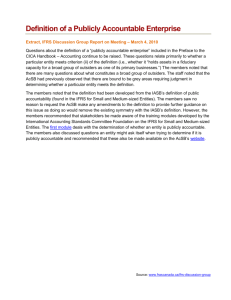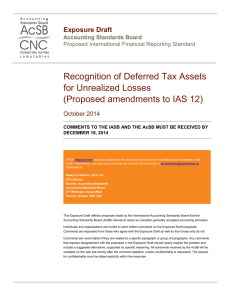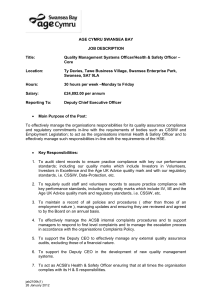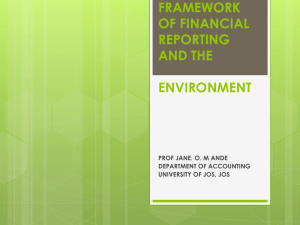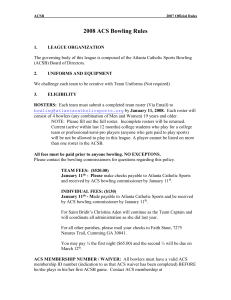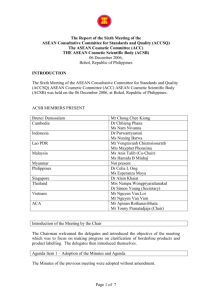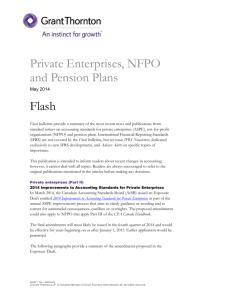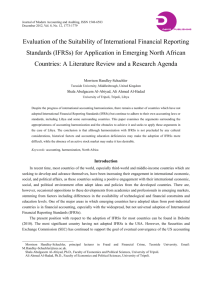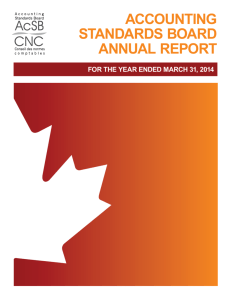AcSB Strategy for Publicly Accountable Enterprises
advertisement
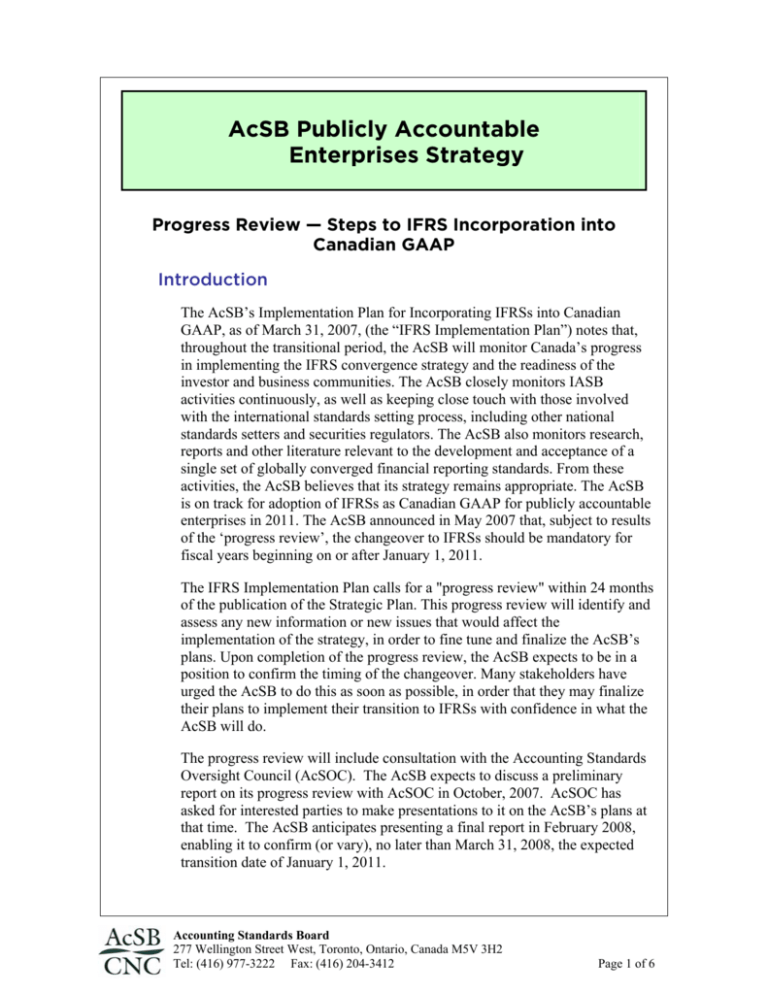
AcSB Publicly Accountable Enterprises Strategy Progress Review — Steps to IFRS Incorporation into Canadian GAAP Introduction The AcSB’s Implementation Plan for Incorporating IFRSs into Canadian GAAP, as of March 31, 2007, (the “IFRS Implementation Plan”) notes that, throughout the transitional period, the AcSB will monitor Canada’s progress in implementing the IFRS convergence strategy and the readiness of the investor and business communities. The AcSB closely monitors IASB activities continuously, as well as keeping close touch with those involved with the international standards setting process, including other national standards setters and securities regulators. The AcSB also monitors research, reports and other literature relevant to the development and acceptance of a single set of globally converged financial reporting standards. From these activities, the AcSB believes that its strategy remains appropriate. The AcSB is on track for adoption of IFRSs as Canadian GAAP for publicly accountable enterprises in 2011. The AcSB announced in May 2007 that, subject to results of the ‘progress review’, the changeover to IFRSs should be mandatory for fiscal years beginning on or after January 1, 2011. The IFRS Implementation Plan calls for a "progress review" within 24 months of the publication of the Strategic Plan. This progress review will identify and assess any new information or new issues that would affect the implementation of the strategy, in order to fine tune and finalize the AcSB’s plans. Upon completion of the progress review, the AcSB expects to be in a position to confirm the timing of the changeover. Many stakeholders have urged the AcSB to do this as soon as possible, in order that they may finalize their plans to implement their transition to IFRSs with confidence in what the AcSB will do. The progress review will include consultation with the Accounting Standards Oversight Council (AcSOC). The AcSB expects to discuss a preliminary report on its progress review with AcSOC in October, 2007. AcSOC has asked for interested parties to make presentations to it on the AcSB’s plans at that time. The AcSB anticipates presenting a final report in February 2008, enabling it to confirm (or vary), no later than March 31, 2008, the expected transition date of January 1, 2011. Accounting Standards Board 277 Wellington Street West, Toronto, Ontario, Canada M5V 3H2 Tel: (416) 977-3222 Fax: (416) 204-3412 Page 1 of 6 This document sets out in more detail the nature and extent of the progress review. As with the IFRS Implementation Plan, the AcSB welcomes and encourages comments on these planned activities. Comments may be submitted at any time to ed.accounting@cica.ca. Page 2 of 6 Scope of the Review and Criteria for the Assessment The main purpose of the progress review is to assess whether there is any new evidence suggesting that the proposed timing for adoption of IFRSs is not appropriate. The intention is not to develop a new or significantly revised strategy, nor to provide an opportunity for those who disagree with the IFRS convergence strategy to reiterate their views. The AcSB would only consider the possibility of a change in strategic direction in the unlikely event that there was a fundamental change in circumstances that negated the rationale for the strategy. The progress review will seek to identify any possible impediments to changing over to IFRSs in accordance with the original plan. The following factors will be the subject of the progress review. (a) Progress in Canada in addressing IFRS implementation issues, including efforts by individual affected enterprises to plan and carry out necessary changes — This is the principal issue to be addressed. In this regard: • particular attention will be paid to the circumstances of smaller publicly accountable enterprises; and • an assessment will be made of preparedness in various processes that presently support Canadian GAAP, such as professional disciplinary and inspection systems, market regulation systems and education programs. (b) Any significant difficulties encountered in the initial adoption or ongoing application of IFRSs in the European Union, Australia and other countries — In assessing the experience of other major markets in the initial adoption of IFRSs, the focus will be on: • common questions and problems encountered; • whether there was any significant market disruption; and • what insights they might have, with the benefit of hindsight. (c) The ability of the IASB to continue to develop high-quality standards that are accepted as contributing to the improved functioning of global capital markets — This assessment will place particular emphasis on the functioning of the IASB’s partnership with the FASB and the ability of the IASB and its Interpretations Committee to address issues effectively and manage their priorities and workloads on a timely basis. In all cases, the focus will be on information and issues arising since the implementation plan was developed, such as any unforeseen problems in the transition to IFRSs, and any new IFRSs issued that have created unforeseen difficulties that might cause a delay in implementation. In many cases, an absence of information or problems is evidence of support for proceeding as originally provided for in the Strategic Plan. Page 3 of 6 The AcSB will seek out information and will make available on its web site (www.acsbcanada.org) reports on the information that it has reviewed as it proceeds with the progress review. Constituents will then be in a position to evaluate whether the information consulted is complete — and if not, draw to the AcSB’s attention any information that might appear to be relevant, but missing from, the AcSB’s analysis. Further details regarding the information-gathering process is provided in the Appendix to this document. Anyone interested in meeting with the project staff, or otherwise participating in the progress review, should contact Karen McCardle at 416-204-3465 or karen.mccardle@cica.ca. Page 4 of 6 Appendix Lines of Enquiry (items are listed in no particular order) The following is not an all-inclusive list, nor will every listed line of enquiry be pursued if there is sufficient evidence from other sources to conclude on the timing of the transition as envisioned by the progress review. (a) Is sufficient progress being made in Canada in establishing the infrastructure for IFRS implementation? The following will be consulted: • • • • • • • • • • Regulators, including the Canadian Securities Administrators and Office of the Superintendent of Financial Institutions, regarding their assessment of the impact on the markets that they regulate. Financial analysts, including the AcSB’s User Advisory Council. Results of any surveys made by third parties of Canadian publicly accountable enterprises’ awareness and preparedness for IFRSs. Major industry groups such as real estate, oil and gas and extractive, financial services, retail and technology (i.e., biotechnology, software, etc.). Financial statement preparer groups, such as the Financial Executives Institute. Smaller PAEs. Major accounting firms in Canada. Accountancy bodies, including CICA, CGA, CMA, and ACCA. Academics, including the AcSB’s Academic Advisory Council, and those developing primary and continuing professional education. AcSB’s IFRS Advisory Committee. (b) Were there any significant difficulties encountered in the initial adoption or ongoing application of IFRSs in the European Union, Australia and other countries that the AcSB should consider in determining the timing of implementing the strategy for PAEs? The following will be considered: • • • • • Studies completed by professional firms, regulators, other market participants and academics. Results of the European Commission’s Internal Market DirectorateGeneral study of the implementation across Europe of IFRSs, being conducted by the Institute of Chartered Accountants of England and Wales (expected in mid 2007). General business media reporting. Representative groups of preparers. National standard setters and regulators in major capital markets. Page 5 of 6 • • IFRS desks of major accounting firms and senior IASB staff. Financial analysts, including their experience when countries limited IFRS options or added modifications on adoption. (c) Does the IASB continue to develop high-quality standards that are accepted as contributing to the improved functioning of global capital markets? The following will be considered: • • • • • • • • • Commentaries about the quality of IFRSs in the world-wide media to consider whether any valid, pervasive concerns are arising. Whether the standards and interpretations are being unduly influenced by particular political or other special interests. IASB/FASB convergence activities and external commentary on those activities to assess the prospects for continued co-operation. Whether the Trustees’ oversight role continues functioning effectively, in accordance with the IASB Constitution, including the prospects for ongoing funding of the IASB’s work. Whether there is any imminent fundamental change in circumstances that could affect the strategic direction. The basis of adoption by countries in major capital markets that have adopted IFRSs, including whether they have adopted IFRSs “as is” or whether they have made modifications or provided interpretations in addition to those of the International Financial Reporting Interpretations Committee (IFRIC). The acceptance in major capital markets of information provided in financial statements prepared using IFRSs. For example, the acceptance of financial statements prepared in accordance with IFRSs for listing in the US and other major capital markets. Securities regulators’ experience with issuers’ financial reporting in accordance with IFRSs, as reflected in speeches by senior securities regulator’ staff and any formal reports issued by those bodies, etc. The SEC proposal to remove its GAAP reconciliation requirement lends support to the acceptance of IASB standards, but its removal is not a prerequisite to proceeding with the IFRS convergence strategy. Literature regarding effects of the switch to IFRSs on global capital markets (commentaries by standard setters, investment dealers, rating agencies, etc., surveys and reports by major accounting firms, and research studies by academics). Page 6 of 6
